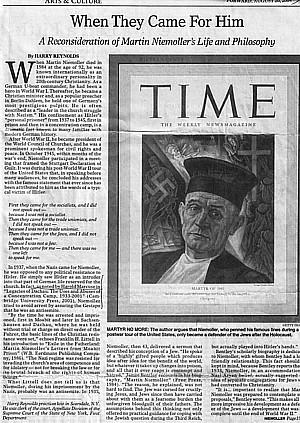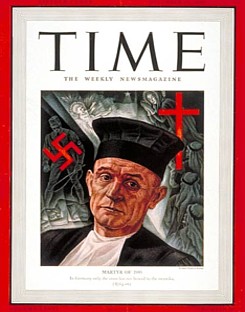blog entry by Harry
Reynolds, posted Jan. 10, 2004,
source: http://scarsdale.blogdrive.com/
[in June 2005 the blog only went back to June 2004; on 7/24/2016 I found a link to the original entry; Reynolds reposted this entry, slightly edited, on December 20, 2015 at: scarsdalejournal.com/2015/12/martin-niemollers-famous-statement]
|
On August
20, 2004, Reynolds published
this blog entry in the New York weekly Forward:
"When They Came For Him:
A Reconsideration of Martin Niemoller's
Life and Philosophy"
(online version of Aug. 20, 2004 article).
In this article Reynolds cites Marcuse:
"In 1937, when the Nazis came for Niemoller,
he was opposed to any political resistance to Hitler. He simply
saw Hitler as an intruder into that part of German life reserved
for the church. In fact, as noted by Harold Marcuse in "Legacies
of Dachau: The Uses and Abuses of a Concentration Camp, 1933-2001"
(Cambridge University Press, 2001), Niemoller tried to avoid arrest
by assuring the Gestapo that he was an antisemite."
Marcuse responds:
While this is true, Niemöller had also been helping Jews in
his Berlin parish prior to that time (after 1934). And I think that
what a man says when attempting, in a dictator's court, to avoid
imprisonment, torture and possibly worse, should not be held against
him.
|
Saturday, January 10, 2004
MARTIN NIEMOLLER'S FAMOUS STATEMENT
When at the age of ninety-two Martin Niemoller died in 1984, he was internationally
known as an extraordinary personality in twentieth- century Christianity.
As a German U-boat commander he had been a hero in World War I. Thereafter,
he became a Christian minister and, as a popular preacher in Berlin-Dahlem,
he held one of Germany’s most prestigious pulpits. He is often described
as a "leader in the church struggle with Nazism." His confinement
as Hitler’s "personal prisoner" from 1937 until 1945,
first in prison and then in a concentration camp, is a dramatic fact known
to many familiar with modern German history. After World War II, he became
president of the World Council of Churches, and he was a prominent spokesman
for civil rights and peace. Indeed, as early as October, 1945, within
months of the war’s end, Niemoller participated in a meeting that
framed the Stuttgart Declaration of Guilt. It was during his post-World
War II tour of the United States that, in speaking before many audiences,
he concluded his addresses with the famous statement that has ever since
been attributed to him as the words of a typical victim of Hitler.
"First they came for the socialists, and I did not speak out -
because I was not a socialist.
Then they came for the trade unionists, and I did not speak out -because
I was not a trade unionist.
Then they came for the Jews, and I did not speak out-because I was not
a Jew.
Then they came for me - and there was no one left to speak for me."
In fact, however, when in 1937 the Nazis came for Niemoller, he was opposed
to any political resistance to Hitler. He simply saw Hitler as an intruder
into that part of German life reserved for the church. Thus Professor
Franklin H. Littell in Exile in the Fatherland writes of Niemoller:
"By the time he was arrested and imprisoned, first in Moabit and
later in Sachsenhausen and Dachau, where he was held without trial or
chargeon direct order of the Fuhrer, the basic lines of the Christian
resistance were set: the Nazi regimwas resisted for invading the church’s
area of competence and for idolatry - not for breaking thelaw or for
its brutal breach of the rights of human beings. Niemoller, who was
at the time a religious andpolitical conservative, was in any case opposed
to political resistance." [1]
What Exile in the Fatherland does not tell us is that Niemoller,
even as a Christian minister imprisoned by the Nazis, was probably an
anti-Semite as he sat there in his cell. For example, in 1935 Niemoller,
then forty-three years old, delivered a sermon that described his conception
of a Jew. James Bentley writes [2] :
"For centuries Christian churches had dedicated the tenth Sunday
after Trinity to remembering the destruction of the Jewish temple and
the fate of the Jewish people. Niemoller habitually preached on this
theme on the appointed day, introducing into his sermon such notions
as that of the ‘Wandering Jew’, who has no home and cannot
find peace. He spoke(in 1935) of a ‘highly’ gifted people
which produces idea after idea for the benefit of the world, but whateverit
takes up changes into poison, and all that it ever reaps is contempt
and hatred. The reason, he explained,was not hard to find. The Jew was
cursed for crucifying Jesus, and Jews since then have carried about
with them as a fearsome burden the unforgiven blood-guilt of their fathers.
The assumptions behind this thinking not only offeredno practical guidance
for coping with the Jewish question during the Third Reich but actually
played into Hitler’s hands."
Bentley’s scholarly biography is not hostile to Niemoller. It
is dedicated to members of Niemoller’s family and Bentley himself
had a long, friendly relationship with Niemoller. These facts are to be
kept in mind because Bentley reports Niemoller in 1933 as a Christian
minister who, in an accommodation of Nazi Aryan belief, actually suggested
the idea of separate congregations for Jews who had converted to Christianity.
Of this corrupt idea Bentley writes [3]:
"It is...important to realize that Martin Niemoller was prepared
to contemplate such proposals. This makes all the more impressive his
development as a defender of the Jews - a development that was not complete
until the end of World War II.’
Surely, it is a curiously compassionate thing to congratulate a fifty-three
year old Christian minister for his impressive achievement in 1945 in
having finally developed into a defender of Jews at the end of the Holocaust.
Last, and most tellingly, Niemoller was in prison on Kristallnacht,
that November 9th day in 1938 when, among other appalling anti-Semitic
acts, Stormtroopers set afire 119 synagogues, 91 Jews were killed, and
more than 30,000 Jews were arrested and sent to concentration camps. Niemoller
admitted to his briographer, Bentley, that "It became clear only
then that the Jews were to be eliminated not simply from the church but
from human society."[4] Now, although Niemoller saw in Kristallnacht
the death of all Jews, knew of Germany’s anti-Semitic laws that
preceded and followed Kristallnacht, and was aware of the overwhelming
evidence of public Nazi barbarity towards Jews that accompanied Hitler’s
exercise of power, Niemoller nevertheless, upon Hitler’s invasion
of Poland in September, 1939, and the ensuing declaration of war between
Britain and Germany, volunteered "to fight for Adolph Hitler’s
Germany".5 In that September, Niemoller, a forth-seven year old Christian
minister, who was then still Hitler’s "personal prisoner",
wrote to Admiral Raeder, "offering, as a reserve officer, to serve
his country ‘in any capacity’ ".6 His letter was released
by the Nazis to the world’s press.
This offer to serve the Nazis was made by a man whose famous words,
uttered after the defeat of Germany, so appeal to us. This offer to serve
the Nazis "in any capacity" was made by a man who, when "they
came for the Jews", failed to speak out because he was a common variety
of anti-Semite. This offer to serve Hitler "in any capacity"
was made by the man who, "after they came for me", spoke out
for himself by offering to bear arms for them, for those who, had they
won the war, would have searched the earth to kill every Jewish man, woman,
and child.
Harry Reynolds |

